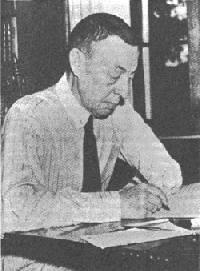
One of the great Russian pianists, composers, and conductors, Sergei Rachmaninoff was extremely popular in his time and is still listened to today. Rachmaninoff’s music was listened to by people around the world during his life which was from 1873 to 1943. He was always in demand wherever he performed. But, Rachmaninoff sometimes doubted himself. “I have chased three hares. Can I be certain that I have captured one?” Rachmaninoff said this in reference to himself about piano, composition, and conducting. The study of his life can only allow complete understanding of his music, for he wrote what he felt. Sergei Rachmaninoff was born in 1873 in the province Novgorod, Russia. His family had aristocratic descent and musical talent. His mother pushed him to start playing the piano at age four. Later he was taught by Mlle Anna Onazkaya, who then decided he should go to St. Petersburgh Conservatoire because of his considerable talent. But, the Conservatoire was not a great help to Rachmaninoff because of a mix-up in his ability, and he did not learn much. His grandmother noticed this and showed Sergei music at churches, encouraged him, and helped him to think of music as a pleasure. After playing for his talented first cousin, Alexandre Siloti, who was a student of Liszt, Rachmaninoff was told to train with Nicholai Sverev. Sverev taught very sternly and took only the best pupils to live with him. He did not charge anything and kept them at his house in Moscow, where they practiced piano three hours a day and met with musical guests on Sundays. Even though Rachmaninoff was becoming a great pianist, he was not learned in theory and the technical parts of music, which was important for a composer. This was helped when Rachmaninoff entered a class at the Conservatoire taught by Arensky. Rachmaninoff became the most advanced student in the class and began composing. He composed a piece that Sverev heard and showed it to Tchaikowsky, who was impressed. To continue his education, Rachmaninoff had to pass an examination. He had no problem with the general examination but wanted to become a composer. For this, Rachmaninoff had to compose and play a Prelude, which was judged by a Board of Examiners, including Tchaikowsky. To pass, Rachmaninoff had to receive a one plus, but instead he received three, showing Tchaikowsky’s approval of his playing. During this period of education, Rachmaninoff had to choose a new teacher. He chose Siloti, the same man who told him to go to Sverev. After an argument with Sverev, Rachamninoff left and stayed at his aunt’s house. But, one year before Rachmaninoff’s completion of his education, Siloti resigned. Instead of facing the perplexities of choosing another teacher, Rachmaninoff decided to take the piano test a year early and passed with honors. Now all Rachmaninoff needed to do was finish his course on composition. To pass the Gold Medal Examination, Rachmaninoff had to compose a few voice songs, a symphony, and a one act opera. Rachmaninoff received a Gold Medal, and was only one of the few to achieve this. Rachmaninoff now began to have his pieces performed in public. A publisher named Gutheil bought his music to publish. “Aleko”, Rachmaninoff’s opera, began to become popular and Rachmaninoff became a famous pianist. He also wrote the Prelude in C Sharp Minor which brought him to real fame. Rachmaninoff was working on his First Symphony at this time. It was performed in St. Petersburg, but the orchestra performed terribly and the critics were predjudiced against Rachmaninoff for being from Moscow. After this failure, Rachmaninoff lost all of his self-confidence. To get his mind off of the Symphony, he began conducting operas. Then, Rachmaninoff went to London and performed some of his pieces. People in London wanted him to return and play his First Concerto, but he didn’t feel it was up to standards. At this time, Rachmaninoff met with a psychologist named Dahl to regain his confidence. He composed the Second Piano Concerto in C Major which was very popular. In 1902 Rachmaninoff married Natalie Satin. This caused his music to become better and he wrote more. After the birth of his daughter in 1906, Rachmaninoff moved out of Moscow to Dresden tohave more peace from the great demands of him to perform in the city. It was here that he met one of his good friends, Nicholas von Struve. He also worte “The Isle of the Dead” and the Second Symphony during his time in Dresden. Rachmaninoff was very much in demand all throughout Europe and was asked to perform in the United States in 1909. For this he wrote the Third Piano Concerto (it is featured in the movie “Shine”). In 1910 Rachmaninoff became the Vice-President of the Imperial Music Society, which controlled the musical schools in Russia. He worked hard at this and made many improvements. In, 1917, the Bolshevik Revolution caused Rachmaninoff to leave the country. He had to depart from his beloved country and abandon all of his possessions behind. He and his family moved to America. Here he performed many concerts, which didn’t allow him to compose much at first. In 1931 he wrote the Paganini Rhapsody, and he composed his last work in 1936, the suite of Symphonic Dances. His last performance in public was February 17th, 1943, and he died on March 28, 1943 of cancer. He was honored by memorial concerts in New York and London. Rachmaninoff was greatly admired. In public, he always appeared to be cold, but his family and friends knew the real Sergei Rachmaninoff, who was friendly and had many hobbies. But, the reason that Rachmaninoff will be remembered is not so much his life, piano performances,
or conducting but his music, which is still played and listened to today. 
Links to other interesting sites :
facts about the Rach III.
his page at Classical Music.
back to our Main-page.